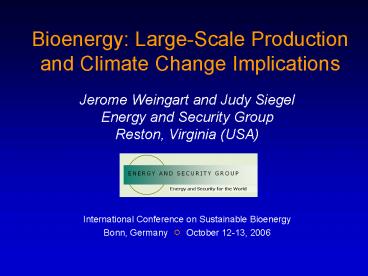Bioenergy: LargeScale Production and Climate Change Implications
Title:
Bioenergy: LargeScale Production and Climate Change Implications
Description:
Bioenergy: Large-Scale Production and Climate Change ... Tropical forest replacement by monocrops. Deforestation ... Soil erosion, mud s, and forest fires ... –
Number of Views:79
Avg rating:3.0/5.0
Title: Bioenergy: LargeScale Production and Climate Change Implications
1
Bioenergy Large-Scale Production and Climate
Change Implications
- Jerome Weingart and Judy Siegel
- Energy and Security Group
- Reston, Virginia (USA)
International Conference on Sustainable
Bioenergy Bonn, Germany ? October 12-13, 2006
2
Focus of presentation
- Principal climate impact areas large-scale
biomass production and use for energy - Research and analysis necessary to understand
these impacts - Case example potential of liquid biofuels to
offset GHG emissions in the road transport sector
of developing Asia (excludes Japan, S. Korea,
Singapore).
3
Constraints Biofuels Production and Use
- Environmental impacts (land conversion)
- Tropical forest replacement by monocrops
- Deforestation
- Diminished ecological diversity and resilience
destruction of wildlife habitat - Nutrient leaching
- Pollution from chemicals
- Loss of watersheds
- Soil erosion, mud slides, and forest fires
- Need to protect soil productivity, water quality,
and other ecosystem services (WRI)
4
Constraints Biofuels Production and Use
- Potential competition for food production
- Availability of suitable land
5
Land required for long-term global biofuels
feedstock production (10 substitution)
IEA (2004) Automotive Fuels for the Future (pp
75-76)
6
Biofuels from field to wheels monocropping,
diversity reduction, and destruction of habitat
Oil palm plantation
7
Climate Change Issues
- Climate system impacts through altered land use
and massive cultivation (including water use) - Altered surface roughness
- Altered evapotranspiration rates
- Altered surface albedo
- Nitrogen oxides methane from agriculture
- (others) For panel discussion today
8
Biofuels Climate Benefits
- GHG emissions displacement
- Improved air quality (tailpipe emissions
reductions) - Reclamation of degraded land (e.g. via Jatropha)
- Reduction of sand storms and atmospheric dust
- Slowing of desertification (eventual reversal?)
9
Greenhouse Gas Emissions from the Asia Vehicle
Transport Sector
Scenarios for market penetration of low-GHG
biofuels
J. Weingart (2006). Analysis for the Asian
Development Bank
10
Global GHG Emissions from Energy
World Resources Institute (2005). Navigating
the Numbers
11
Global GHG Emissions from Transport
World Resources Institute (2005). Navigating
the Numbers
12
Road fuels global production in 2005
13
(No Transcript)
14
IEA/SMP International Energy Agency /
Sustainable Mobility Project
15
(No Transcript)
16
China from this, to
17
this, and to
18
This!
19
The future (?) 6-fold GHG emissions growth from
Asia road transport
Reference case (from IEA/SMP model)
20
Why are we interested in biofuels for the Asian
road transport sector?
- Potentially competitive with petrofuels
- Indigenous, can offset imported petroleum
- Significant reduction in tailpipe emissions
- Potential for major reduction (80 95) in net
unit life-cycle GHG emissions compared with
petrofuels, and - Potential for large-scale sustainable production
(perhaps)
21
What is a scenario?
- A scenario is like a screen play for the future.
- A scenario is NOT a prediction it asks what
if, using rules that reflect real world market
dynamics and constraints
22
What is a market penetration scenario?
- Model of a possible future
- Analytic logistic penetration model for
increasing market share of an intruder into an
incumbent market (S-shaped curve) - Permits specification of key parameters to assess
impacts of alternative penetration rates and
ultimate market fraction for new options
23
Stages of market penetration
Illustrative phases of market development
Maturation
Market dynamism
Takeoff
Expansion
Prototype
Pioneering
24
Two illustrative scenarios biofuels penetration
of road fuel markets in Asia
- 10 to 90 penetration in 50 years
- Logistic (S-shaped) penetration
- Extreme biofuels market penetration S1
- Potential market 50 road fuels
- 75 lower associated GHG emissions
- Ultimate biofuels market penetration S2
- Potential market 100 road fuels
- 90 lower associated GHG emissions
25
GHG Emissions Impacts of Biofuels
Field-to-wheel CO2-equivalent GHG emissions from
biofuels, per km, relative to base fuel
Source L. Fulton (2004), IEA (currently at UNEP
Nairobi)
26
Asia road transport GHG emissions with and
without accelerated biofuels penetration S1
Business as usual GHG emissions
Biofuels and reduced GHG emissions
27
Asia road transport GHG emissions with and
without extreme biofuels penetration S2
Business as usual GHG emissions
High biofuels penetration GHG emissions
28
How to maximize biofuels offsets of GHG emissions
- Reduce growth in transport fuel demand
- Increased end use efficiency is much less
expensive than expanding supply - This is the golden rule for renewables
29
Potential next steps
- Consistent life-cycle analysis for large-scale
bio-ethanol and biodiesel production/use
(platform for climate impact analysis and
assessment) - Collaboration among national biofuels working
groups using compatible LCA and environmental
impact methodologies - Establishment of biofuels collaboratives for
collaboration, coordination, technical
assistance, and knowledge management
30
New Bioenergy Center (Washington, DC)
- International NGO Renew the Earth has established
a bioenergy center - Purposes include
- Bioenergy information clearinghouse
- Analysis of alternative bioenergy options
- Assessment of bioenergy sustainability
requirements and opportunities
31
For more information
- Judy Siegel
- judy_at_energyandsecurity.com
- Jerome Weingart
- jmweingart_at_aol.com
32
(No Transcript)































